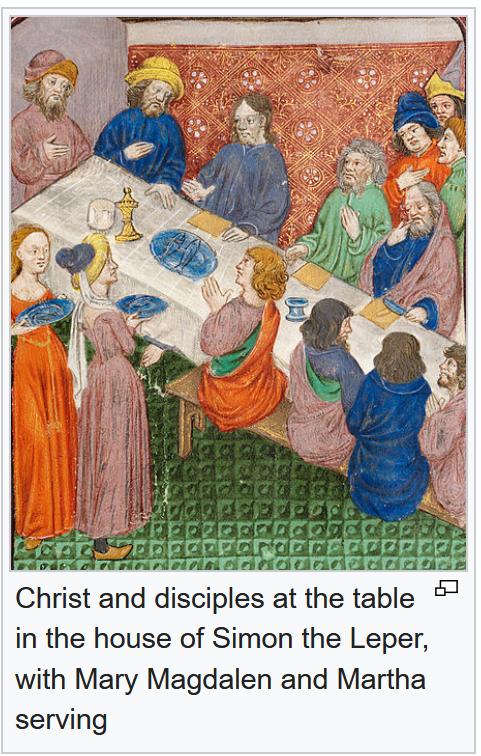Lent is a time of preparation for remembering our Lord’s death and resurrection and by faith what he did for us. The reflection for us today is based on Simon the Lepers house and the woman who anointed Jesus in preparation for his burial. The story begins:
When Jesus had finished saying all these things, he said to his disciples, 2 “As you know, the Passover is two days away—and the Son of Man will be handed over to be crucified.”3 Then the chief priests and the elders of the people assembled in the palace of the high priest, whose name was Caiaphas, 4 and they schemed to arrest Jesus secretly and kill him. 5 “But not during the festival,” they said, “or there may be a riot among the people.”
Jesus Anointed at Bethany
6 While Jesus was in Bethany in the home of Simon the Leper, 7 a woman came to him with an alabaster jar of very expensive perfume, which she poured on his head as he was reclining at the table.
8 When the disciples saw this, they were indignant. “Why this waste?” they asked. 9 “This perfume could have been sold at a high price and the money given to the poor.”
10 Aware of this, Jesus said to them, “Why are you bothering this woman? She has done a beautiful thing to me. 11 The poor you will always have with you,[a] but you will not always have me. 12 When she poured this perfume on my body, she did it to prepare me for burial. 13 Truly I tell you, wherever this gospel is preached throughout the world, what she has done will also be told, in memory of her.”
Judas Agrees to Betray Jesus
14 Then one of the Twelve—the one called Judas Iscariot—went to the chief priests 15 and asked, “What are you willing to give me if I deliver him over to you?” So they counted out for him thirty pieces of silver. 16 From then on Judas watched for an opportunity to hand him over. Taken from Bible Gateway.

The main theme of this story is about the woman who anointed Jesus’ feet with expensive perfume. This story is about the last stage of our Lord’s life in this world since his incarnation. Take note that while Jesus was in Bethany, the chief priests and elders were hatching a plan to kill Jesus. Also take note that after the main story Judas one of his own disciple was going to betray Jesus. The stage was set in the house of Simon theLeper. There are many conjectures who he was and whether he was healed or not. We know nothing about these things but we do know that some serious things were happening in the close knit world of these disciples. The other disciples seem to be completely oblivious to the fact that Jesus was going to die. Here a woman outside of the twelve had great faith. She was mourning for the death of her Master. She anoints Jesus body with the costliest perfume. The disciples were more interested in the cost of the perfume and how it could have been sold. Even here we see various motives at work.
Jesus our Lord seeing these things need to teach the disciples why this was happening. Our Lord explains to them that he is going to die, that he ‘will not always be with them’. Jesus tells them plainly that the woman is preparing his body for his funeral.

They still did not understand. Money and wealth can affect people in different ways and here in the microcosm of the disciples world various intentions were being played out
- The woman saw beyond all the disciples and grieved for our Lord.
- Other disciples thought it was a waste of money because it could have helped the poor
- Judas Iscariot was angry because being in charge of the money he wanted to steal from it.
There would have been other motives individually but this is all that I can gain from this story at the moment. Judas saw an opportunity to make some extra money by handing Jesus over to the elders of the people. We don’t know the complete intention of Judas but later on Judas did commit some form of Suicide.
We too like the disciples have intentions and motives in life.

The woman was full of love for our Lord and she knew that he was going to die. Perhaps she did not see the whole story that His resurrection would take place three days after his death . She saw enough to realize that Jesus was very special, He was the Messiah.
Looking back retrospectively back to this story we know that these disciples would also die for Jesus. They were still immature and did silly things arguing over how the finances could be used. But they loved the Lord Jesus their Messiah, the true king of Israel and the world.
Tradition says Peter was crucified upside down; Andrew got crucified in Russia; Thomas was murdered in East Syria by four soldiers; Philip was murdered after he converted a Roman proconsul’s wife to Christianity; Some stories say he was murdered in Etheopia; We know that John outlived them all and we are blessed with John’s Gospel, the Letters of John and the book of Revelations.
(from christianity.com/church/church-history/timeline/1-300/whatever-happened-to-the-twelve-apostles-11629558.html)
Judas’ greatest sin was to love money and wealth and we know what our Lord said about that; “You cannot serve God and mammon” at the same time.

We also need to stop and look at our intentions. Are our intentions and motives and pure like the woman who anointed Jesus preparing his for burial. Do we spend time in prayer, seeking the will of God in our lives, with humble submission to Scripture which searches out those deep inner things we try to hide from everyone except God. On the other hand have we been like the disciples who were oblivious to what was happening around them until our Lord was arrested? Or do we have a dark deep secret that we want to be rich at any cost, even at the cost of getting someone into trouble for some sort of payment.
We have to be honest with ourselves and ask the question; Do I love God most or do I love myself most. There may have been many roads that led to Rome but even for the Romans I think the Appian way was special.
We need to stop and remember Jesus’ teaching about two roads; the road that takes us to God’s Kingdom and the road that takes us to the same place as those rebellious angels and to their hot lake. God is Love and he wants us to draw close to himself. Yet we must ask the question if heaven is so perfect where there are no tears. Why is heaven without tears. Heaven is without tears because Jesus Christ took our sins in his death and by his resurrection we can be brought into new life. Life without hatred, or greed, or selfish ambition et al. Those who make it into heaven are those who realize they are sinners and come to the cross of Christ and out of a pure heart asks God to forgive them and save them from their sins. The majority of these Apostles had some serious faults and it is these people ‘the nobodies’ God took and by the Holy Spirit changed the ancient and modern worlds we live in.
So then my friends what is your decision? When God meets us he offers us the narrow road, the difficult road (so we think). In reality when we become citizens of heaven this world loses its luster. Even if we had all the wealth in the world and all power, death is the equalizer… Those who choose to be with Christ, death is no equalizer because Christ paid the price at the cross.


